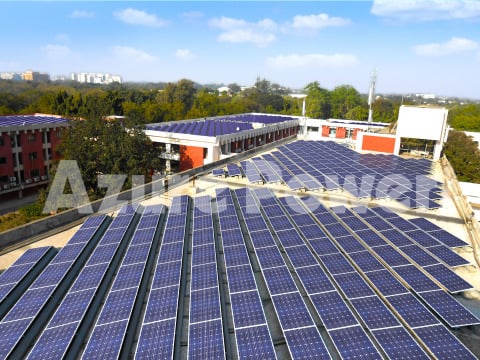
Indian solar developer Azure Power has experienced minor curtailment of the electricity generated from its PV power plants during the pan-India lockdown enforced since 25 March, which has now been extended to 3 May.
Curtailment has been a worry for solar developers given the significant decrease in power demand across India since industry and social activity contracted in attempts to mitigate the coronavirus outbreak. However, the Ministry of New and Renewable Energy (MNRE) moved quickly to reinforce rules already in place that state renewable energy players should be given 'Must-run' status and therefore be the last of all power sources to be curtailed where necessary.
Try Premium for just $1
- Full premium access for the first month at only $1
- Converts to an annual rate after 30 days unless cancelled
- Cancel anytime during the trial period
Premium Benefits
- Expert industry analysis and interviews
- Digital access to PV Tech Power journal
- Exclusive event discounts
Or get the full Premium subscription right away
Or continue reading this article for free
MNRE secretary Anand Kumar went on Twitter to publicise the fact that must-run rules will not change during the COVID-19 period:
All State Governments are urged to not to curtail #RE Power at this time, as that is going to affect future investments in the #RenewableEnergy sector in the country. @RajKSinghIndia @PMOIndia @secretary_mnre
— ANAND KUMAR (@aanandk27) April 1, 2020
In an operational and financial update, Azure Power stressed that, despite the minor curtailments, its operational projects “have not been materially impacted” by the coronavirus outbreak. This is partly due to the power sector being declared as an ‘essential service’ during the lockdown period.
Azure claimed to have been receiving payments for its electricity supply mostly as normal so far. However, distribution companies (Discoms) are already experiencing low demand and delays in payments from their customers due to COVID-19, so Azure has also received Force Majeure notices from various Discoms stating their inability to meet their obligations under the power purchase agreement (PPA).
Such instances have been counteracted by MNRE’s reinforcement of renewables’ aforementioned must-run status and its clarification that any curtailment – except for grid safety reasons – would count as deemed generation. In further support of power generators, the Ministry of Power has also written to all state governments stressing that obligations to pay for power within 45 days of receiving a bill also remain the same.
Solar Energy Corporation of India (SECI) subsequently denied the Force Majeure claims from the Discoms as a result of these moves by the Ministry of Power and MNRE.
Looking ahead, Azure claimed that its liquidity position would remain sufficient to continue normal operations through to at least the end of the 2021 fiscal year, even if only some of the highest debt-rated counterparties and off-takers, such as Indian government-owned SECI, continue to make payments for the electricity received.
Construction halt
On the flip side, Azure’s 1,290MW of under-construction plants have been stopped until the lockdown ends. Counterparties have recognised Azure's own Force Majeure claims in these cases and no penalties are expected to be incurred as a result of delays. Nor are metal and PV module prices seen as a threat to project builds due to the sap in global demand causing a drop in prices at present.
Financing for under-construction projects remains on schedule with the Assam 1 (90MW) and Rajasthan 6 (600MW) projects having debt funding in place. Azure has received a commitment from EDC, Societe Generale, and MUFG Bank for the debt funding for its Rajasthan 8 (300MW) project and it is also in advanced discussions with banks for the debt funding of the Rajasthan 9 (300MW) plant.
Azure has also more or less maintained its financial and operational megawatt guidance for the next two financial years and noted that there have not been any cases of coronavirus reported by Azure employees as of 10 April.
Last week, the government delayed by six months the introduction of a new rule forcing government-backed solar projects to source components from a pre-authorised registry of providers.
Prime minister Narendra Modi appeared on television earlier today announcing an extension to India's lockdown, which had also been due to come to an end today (14 April).






